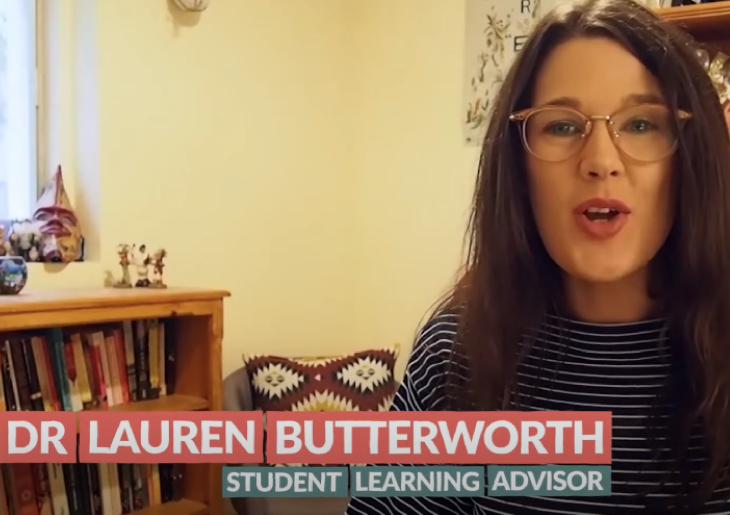
Hey fam!
We are so close to the end of semester. I can practically smell it in the air – or maybe that’s just all the rain. Really, though, is encroaching winter itself not a sign that semester is creeping to an end? But that creep usually brings with it a lot of stress, and that’s at the best of times!
A few weeks ago I spoke to Dr Lydia Woodyatt about how we can manage stress by understanding what stress is, how it affects our mind and body, and what simple things we can do to help ourselves manage stress in the long-term. This week, we’re delving back into this topic because it’s super important.
I’m heading back to campus next week. I have to admit, while part of me is excited to leave my house and return to a sense of normality, part of me is really anxious about this change. The world that I’m returning to is going to look so different to the world I left. We all have to adapt to the ‘new normal’ but this is confronting. I don’t know what this means for myself or my friends and family and while I’m relieved that we’re doing really well as a state, I’m still anxious about how I, and those around me, are going to bounce back from this.
So I asked Dr Gareth Furber, who you’ve heard me talk about a million times, to give us some guidance about a really important subject: resilience.

What is Resilience?
People are confronting significant adversity: financial adversity, social adversity, people are losing jobs and having to change the way they work or home school their kids. It’s been a really unusual time and people have been coping with a lot.
Resilience is essentially the ability to cope with, adapt with and bounce back from setbacks. While I’d love to guarantee people, they won’t face setbacks in their life, they will. Its just part of being a human being. This raises the question of how we deal with these setbacks, which might range from just the frustrations of everyday life, through to bigger losses and frustrations that we encounter in our life. How we respond to and bounce back to that adversity is partially governed by our resilience level.
You probably know people who you think cope well with setbacks seem to know what to do and how to respond in times of stress. Then you probably know other people who probably don’t deal with adversity well, who seem to get derailed by the slightest kind of stressful event.
The question is, can we build resilience over time or is it fixed? Is how resilient you are now how resilient you’ll be for the rest of your life? I’ve posed this question to multiple mental health professionals over my time. The general view is yes, you can build resilience. You can get more resilient over time. But it requires training. I liken it to weight training. If you want to get big and physically strong, you’ll need to weight train and it needs to be purposeful and effortful. Same with if you want to be more mentally strong: you’ll need to train. But we’re not necessarily taught how to train our minds to be mentally strong. So, I thought I’d outline a few ways that people can start to train themselves mentally in order to increase their levels of resilience.
- Develop Good Habits
You’re probably sick of hearing this by now, but having a good diet, getting physical activity, and good quality and the right amount of sleep are a foundation for good physical and mental heath. I would also add a meditative practice to that as well. We’re all biological organisms and how well we look after our biology will dictate how capable we are of withstanding stress of a physical or mental nature in the future.

- Get Used to Deploying Different Kinds of Coping Strategies
If something happens to you and you think it’s fixable, you need to deploy as many of your resources as you can towards finding a solution. If you don’t know how, it’s about finding the right people who can teach you how.
If the problem is one that’s not fixable or reversable in any way, then you might need to deploy different kinds of coping strategies. For example, we might talk about emotion focussed coping which is dealing with the emotional impact of something that has happened to us. We might talk about meaning making which is to look at something that has happened to us and try to extract from it some positives or a silver lining or something that we can take away so it’s no longer just a negative event in our memory. Or we might need to look at cognitive strategies to see if we can take a different perspective on the problem and see if that can help us adapt to, or cope with what has happened.

- Mental Rehearsal.
This is something that sports psychologists recommend to elite athletes. To do this, we mentally rehearse how we’re going to cope with known stressors. As a student, there are a bunch of stressful events in your life that you can predict: exams, due dates, placements. You know when those are coming up and you know that there’s a high likelihood that they’re going to be stressful. So, you mentally rehearse how you think you’re going to cope with that.
How will you spend your days? What changes will you make to your daily routing? What things will you remind yourself at the time to help you deal with the fact that there’s stress in that situation? This is the same as athletes mentally rehearsing what they’ll do in the final of a completion. They run through scenarios in their head and pick the best one for adapting or performing.
- Financial Literacy and Confidence
I’m very mindful of the fact that when you’re a university student, you don’t typically have great amounts of money. It’s not about wealth building per se, it’s more about feeling confident with the money you do have. So, build good habits around budgeting, saving, and investing if you can. I see frequently that those who feel more confident in their financial situation are more able to withstand setbacks, they don’t have to worry about providing the basic such as food and shelter. This is a good age to start getting used to looking after and managing money.

- Seek Out Activities that Bring You Meaning and Purpose
I’m talking about activities that you don’t’ necessarily know why they’re important to you, you just know that they are! If that’s not necessarily your study or work, I encourage you to seek out new activities and find things that bring that sense of meaning and purpose into your life. For me that s things like spending time in nature and gardening, doing art, and playing guitar. If I don’t have those things in my life, they don’t provide that buffer against the other parts of my life that are perhaps more stressful.

- Surround Yourself with Good People
Build good quality relationships with your friends, nurture relationships with your family and colleagues because at some point you might need to call on those people for help. The quality of the relationship is going to dictate whether they are going to be able to step up and help you.
- Ask for Help when Needed
Sometimes the best solution to the problem is acknowledging that you don’t have the answer and seeking out expertise from someone else. There are layers of help that you can find. It may be as simple as talking to a friend, family member, colleague, or peer. Or you may decide that you need to speak to a professional of some sort. It might be a medical professional, a lawyer or an accountant. There’s no shame in admitting that you don’t have the expertise to deal with a problem. If anything, the resilient people that I know are far more likely to reach out early to someone to get the information they need to solve a problem.

- Regularly Check and Adjust Your Expectations
We will all fail at some point in time. We will all get hurt at some point in time. We will all experience problems that we can’t manage. If we go through life expecting that those things won’t happen, they’ll come as a greater shock when they do. But the balance to that is that you can grow also, and you can get better and you can find happiness and contentment in stages and phases of your life. A term that was introduced to me a while back is ‘realistic optimism’. So you remain optimistic that you can create a better future for yourself, but you’re realistic about what the boundaries of that are and the extent to which you’ll be able to create a ‘perfect’ future versus one that is good enough, satisfying enough, rewarding enough.
So, there are eight methods that you can deploy in your life to help build resilience. If you want to learn more about those, please follow the Student Health and Wellbeing blog or feel free to contact me if you want me to clarify anything!
Natasha
For me, resilience is finding strength and the positive aspects of any difficult situation. Being able to manage and adapt to an issue, continuously learning from mistakes and achieving goals to become the best version of yourself in a sustainable way.
Here’s an example of when I had to be resilient. I was working on a new assignment, but my team was discouraged because we previously did an individual assignment and we got lower grades, lower than we were expecting, and they thought we really couldn’t improve. I really thought we could do well if we communicated clearly and allocated roles, but it was difficult to get other members interested and motivated. One member was in a particularly bad headspace and so I suggested that we discuss what everyone wanted form the assignment and if we thought it would be achievable to get a high grade.
It would have been easy to give up, but together we decided to apply for an extension, reallocate roles if we needed to, and have more frequent meetings to help everyone manage their load. We did end up getting a better grade, but I think this is down to resilience and believing that we could improve, despite the challenging circumstances.

Indianna
My definition of resilience is your ability to bounce back from hardship or failure or when you feel like you just aren’t doing enough, or you’ve had an off day and things aren’t going your way. Personally, I think resilience is your ability to, on those days, to recognise what’s going on, be self-reflective and understand what might be causing those things and being really patient and forgiving with yourself.
I’ve never been as stressed as I was in year twelve. There are a lot of reasons for that: I was struggling with deadlines, with dramas with friendships. I was having troubles in my family. It took a huge toll on my mental health. I was dreading all these future plans I had to make. I didn’t know if I wanted to study after high school.
Mid-way through year twelve, I didn’t think I was going to graduate. I was always a good student, I cared about student, but this last year everything stopped making sense to me. I got to a point where I let down a lot of my standards and I just said, ‘okay, we just have to get it all in, we just have to graduate, don’t focus on your ATAR.’ At that point, I didn’t think I wanted to go to university. I used those things as a tool to push through. In the end I did really well in my schoolwork which is amazing considering all the stress I was going through. But since then I have not ever felt that stressed because I used that as a learning curve to find the tools I need to protect myself from getting to that low again.

What’s Next?
I don’t think they even knew it, but Natasha and Indianna have already been implementing some of Gareth’s strategies! Particularly things like building good habits, deploying different kinds of coping strategies and – really importantly – readjusting expectations. As for me, I think I’m going to spend some time doing some mental rehearsal and picture myself re-entering the ‘new normal’ world and what kinds of differences I’m likely to encounter. I think that’s going to help a lot!
Next week is our last Like a Boss episode for the series, so join us to hear from some of your fellow students about how they’re managing to juggle online study with family, caring and work responsibilities. It’s a particularly difficult one at the moment, so if you’ve doing the juggle yourself, I hope to see you there!

